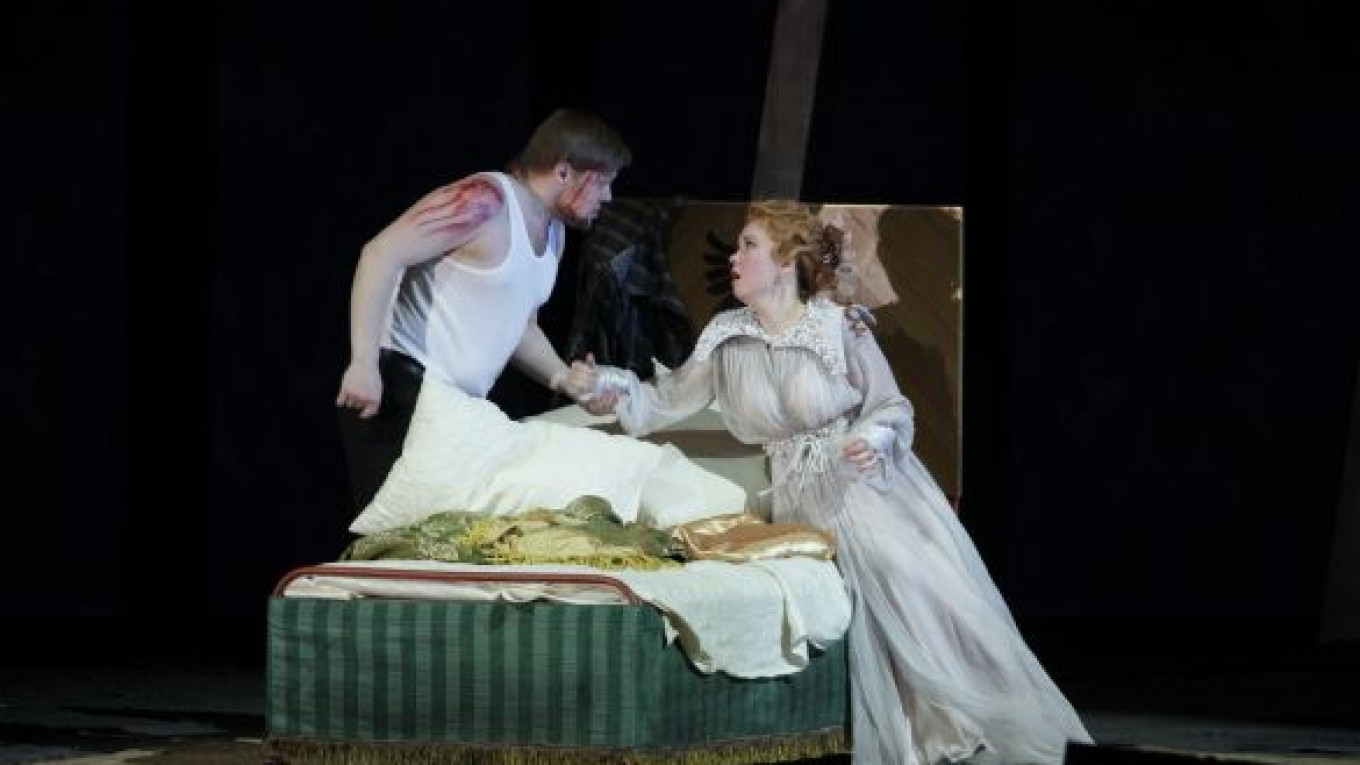ST. PETERSBURG — Claude Debussy's 1902 opera "Pelleas et Melisande" has been turned into a thriller fused with irony and trash esthetic by American director Daniel Kramer at the Mariinsky Theater.
Kramer's rendition of Debussy's tragic tale inspired by Maurice Maeterlinck's play of the same name is a sobering show with mammoth-sized garbage cans, dark metal staircases, torn dresses and stifling darkness relieved only by occasional glimpses of moonlight.
The director has removed Maeterlinck's signature magic and symbolist mysticism, and replaced it with expressionist physicality that focuses on torment, angst and mental fragility. Kramer's visual expressionism, contrasted with the surreal sensuality of Debussy's music, produces an intoxicating effect.
"Pelleas et Melisande" is the story of a love triangle that ends tragically. It begins with Prince Golaud discovering the vulnerable and mysterious Melisande in the woods. The prince marries the enchanting creature, who eventually falls for his half-brother Pelleas. During the course of the five-act drama, we follow Golaud's slow and painful self-destruction. Engulfed by jealousy, Golaud kills Pelleas and tortures Melisande on her deathbed with endless questions about her fidelity.
Debussy created the heroes for his only opera as double-edged swords, and Kramer excels in exposing the paradoxes that define the characters. Melisande (Anastasia Kalagina) is constantly torn between an emotional fragility bordering on hysterics and her feminine power that enables her to pull the strings of Pelleas and Golaud. Her fluctuations reach their climax in the love scene, which ends in Golaud murdering Pelleas in a fit of uncontrolled jealousy.
Pelleas (Andrei Bondarenko) exudes immaturity and youthful innocence, while revealing a sensual potential that creates a real tension on stage when he meets Melisande for the first time. Andrei Serov serves up a mesmerizing portrayal of Golaud as he descends from a respected and composed man into a wreck, ruined by nagging suspicion and jealousy.
The Mariinsky symphony orchestra under the baton of Valery Gergiyev was hypnotic, captivating with nuanced delicate textures and thrilling with a wealth of sound. Dark low strings made the audience feel as if they were in a suspense drama. The orchestra indulged in a feast of brooding passions before taking a sudden and fatal resolution.
The dark side of human nature in "Pelleas et Melisande," makes the show a twin to the company's 2010 staging of Bela Bartok's "Duke Bluebeard's Castle" also produced by Kramer and again based on literary material by Maeterlinck. Kramer rendered Bartok's one-act masterpiece as a modern docu-horror, making crystal-clear parallels between the infamous duke and well-known contemporary sadists who locked their victims in basements so as to turn them into slaves.
Kramer's haunting work gives audiences plenty of food for thought, yet somehow it falls short of touching the soul as much as it works to tease the mind. One thought that comes to mind after reading an interview with Kramer, published in the production's program, is that the theme of forbidden love is also political.
"Look at one of the laws that has just been passed in St. Petersburg," the director said, referring to the notorious bill banning "gay propaganda" that was passed by the St. Petersburg Legislative Assembly this spring.
"Does the human heart have rules? Who decides who we can and cannot love? Can anybody govern our hearts? The revolutions of the human heart are unstoppable in my experience," Kramer said.
Looking back at the Mariinsky Theater productions over the last three years, it is striking that most of them have thrived on provocation, effect, surprise and unorthodox associations, and importantly, these shows — especially their visual elements — appear to be at odds with the music.
The productions made statements, yet they failed to last, a fashionable item that everyone talks about but soon forgets. Perhaps, these shows were not meant to last; perhaps, they were meant to make a statement.
In Kramer's "Pelleas et Melisande," the score and the acting exist in parallel worlds, encouraging audiences to build bridges between these worlds. Many theatergoers may find this exciting, but others may say it fails as a unified whole.
"Pelleas et Melisande" will next play June 8 at 7 p.m. Mariinsky Theater, 1 Teatralnaya Ploshchad. St. Petersburg. Tel. (812) 326-4141.
A Message from The Moscow Times:
Dear readers,
We are facing unprecedented challenges. Russia's Prosecutor General's Office has designated The Moscow Times as an "undesirable" organization, criminalizing our work and putting our staff at risk of prosecution. This follows our earlier unjust labeling as a "foreign agent."
These actions are direct attempts to silence independent journalism in Russia. The authorities claim our work "discredits the decisions of the Russian leadership." We see things differently: we strive to provide accurate, unbiased reporting on Russia.
We, the journalists of The Moscow Times, refuse to be silenced. But to continue our work, we need your help.
Your support, no matter how small, makes a world of difference. If you can, please support us monthly starting from just $2. It's quick to set up, and every contribution makes a significant impact.
By supporting The Moscow Times, you're defending open, independent journalism in the face of repression. Thank you for standing with us.
Remind me later.






